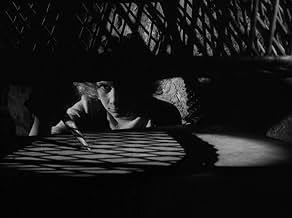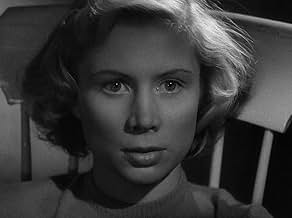NOTE IMDb
6,7/10
2,3 k
MA NOTE
Un réalisateur essaie de créer le meilleur film de l'histoire, mais découvre que les capacités humaines ont leurs limites.Un réalisateur essaie de créer le meilleur film de l'histoire, mais découvre que les capacités humaines ont leurs limites.Un réalisateur essaie de créer le meilleur film de l'histoire, mais découvre que les capacités humaines ont leurs limites.
- Réalisation
- Scénario
- Casting principal
Birgit Lindkvist
- Anna - inneboende på pensionatet
- (as Bibi Lindkvist)
John W. Björling
- En man i Birgitta Carolinas dröm
- (non crédité)
Sven Björling
- En filmarbetare i ateljén
- (non crédité)
Anita Blom
- Anna - Signes kusindotter
- (non crédité)
Britta Brunius
- Lasses mamma
- (non crédité)
Åke Engfeldt
- Ena kriminalpolisen
- (non crédité)
Gösta Ericsson
- Andra kriminalpolisen
- (non crédité)
Kenne Fant
- Arne - Skådespelare
- (non crédité)
Avis à la une
The real prison is in the minds of these people, and in Bergman's in particular. Bergmann was always obsessed with depression and death; it was in all his fllms. Just like violence is in every Sergio Leone film, some directors are obsessed with one emotion or another. In this one, we find supposedly talented artists are having a difficult time with life. O poor little me! Get over it. People with real talent don't get despondent, they get to work. They may get down once in a while, but they bounce back from adversity, and overcome it. These wusses do not. They expect miracles from their mediocre talents and efforts, and are disappointed when they are not recognized as geniuses or great artists. You know how many years Bogart or Streep had to struggle before they became major stars? A lot longer than these no-talents. I hate agreeing with Woody Allen, but Bergmaaaaan is a joke; a bad joke at that. At least the photography is interesting.
Bergman's first film where he wrote his own script, and had real artistic control (in exchange for a tiny budget.).
An aging film professor, just released from a mental asylum, visits an old student, now a successful director, and challenges him to make a film showing that the devil really rules the earth. While dismissive in the moment, the director is haunted by the idea, and a journalist friend suggests the film could take off from his experience interviewing a very young prostitute.
We then enter the prostitute's story, and it's (intentionally) never fully clear if what we're seeing is the film that arose from the concept, or the truth of the girl's life.
Beautifully photographed, and full of inventive touches (the main credits are spoken, not seen, over a long tracking shot of a dark cobblestone street), I was also surprised that it contained more of a dark sense of humor, about itself and the world, then most critics acknowledge. In turn, that keeps the film's occasional youthful over-obsession with despair from ever feeling unbearably sophomoric.
I will admit it lost steam for me in the last third, some of the performers aren't quite up to the heavy burdens of the script, and a few sequences are awkward and bespeak Bergman's comparative youth. But the next morning I found myself haunted by images and moments even if the whole only felt partly successful.
An aging film professor, just released from a mental asylum, visits an old student, now a successful director, and challenges him to make a film showing that the devil really rules the earth. While dismissive in the moment, the director is haunted by the idea, and a journalist friend suggests the film could take off from his experience interviewing a very young prostitute.
We then enter the prostitute's story, and it's (intentionally) never fully clear if what we're seeing is the film that arose from the concept, or the truth of the girl's life.
Beautifully photographed, and full of inventive touches (the main credits are spoken, not seen, over a long tracking shot of a dark cobblestone street), I was also surprised that it contained more of a dark sense of humor, about itself and the world, then most critics acknowledge. In turn, that keeps the film's occasional youthful over-obsession with despair from ever feeling unbearably sophomoric.
I will admit it lost steam for me in the last third, some of the performers aren't quite up to the heavy burdens of the script, and a few sequences are awkward and bespeak Bergman's comparative youth. But the next morning I found myself haunted by images and moments even if the whole only felt partly successful.
This is the earliest Bergman film that I've watched, and already the prime concerns that occupied him throughout most of his career - human relationships, sex, faith, death, etc. - are well in evidence.
Interestingly, the narrative is set against a motion-picture backdrop; in fact, the film demonstrates a self-conscious approach to the medium that would re-emerge in later efforts such as PERSONA (1966) and THE PASSION OF ANNA (1969): rather than observing the normal procedure for the time, the credits don't appear at the outset but, effectively interrupting the proceedings after the first reel, these are given in a voice-over! Besides, the plot seems to be following the interconnecting vicissitudes of a variety of characters - but chiefly the crisis facing two separate couples - all of which, somewhat murkily and pretentiously, serves as a morality play about the triumph of Evil over Good, as envisioned in a framework set inside a studio and involving a film director's old ex-professor (the former happens to be the elder brother of one of the characters in the main narrative!).
It's all rather fascinating for much of the running-time - and the director's visual style really can't be faulted (a dream sequence is especially effective and there's even a short and quite amusing Silent slapstick film-within-a-film, ostensibly the amateurish work of one of the characters!) - but, eventually, the over-ambitious structure of PRISON (by the way, neither this vague title nor the equally well-known alternate given the film on its American release, THE DEVIL'S WANTON, really serve the purpose of its existentialist theme and generally introspective tone), to say nothing of the relentless gloominess, wear the whole down somewhat. All in all, however, it's a fine piece of work from a film-maker who would go on to become one of the leading forces in cinema during the second half of the 20th century.
Interestingly, the narrative is set against a motion-picture backdrop; in fact, the film demonstrates a self-conscious approach to the medium that would re-emerge in later efforts such as PERSONA (1966) and THE PASSION OF ANNA (1969): rather than observing the normal procedure for the time, the credits don't appear at the outset but, effectively interrupting the proceedings after the first reel, these are given in a voice-over! Besides, the plot seems to be following the interconnecting vicissitudes of a variety of characters - but chiefly the crisis facing two separate couples - all of which, somewhat murkily and pretentiously, serves as a morality play about the triumph of Evil over Good, as envisioned in a framework set inside a studio and involving a film director's old ex-professor (the former happens to be the elder brother of one of the characters in the main narrative!).
It's all rather fascinating for much of the running-time - and the director's visual style really can't be faulted (a dream sequence is especially effective and there's even a short and quite amusing Silent slapstick film-within-a-film, ostensibly the amateurish work of one of the characters!) - but, eventually, the over-ambitious structure of PRISON (by the way, neither this vague title nor the equally well-known alternate given the film on its American release, THE DEVIL'S WANTON, really serve the purpose of its existentialist theme and generally introspective tone), to say nothing of the relentless gloominess, wear the whole down somewhat. All in all, however, it's a fine piece of work from a film-maker who would go on to become one of the leading forces in cinema during the second half of the 20th century.
"Prison" (1949) is the first film in which Ingmar Bergman develops something like a style of his own.
We see various elements that reappear in later movies. There is the character of death (to reappear in "The seventh seal", 1957) and dreamsequences (to reappear in "Wild strawberries", 1957).
The most important sign for things to come is however the theme of the film. The film is about a director trying to make a film about a world governed by the devil. Is a world governed by the devil not very much like a wordl where God is silent? Later Bergman would make a trilogy around this theme consisting of the films "Through a glass darkly" (1961), "Winterlight" (1963) and "The silence" (1963).
So in "Prison" Bergman started to experiment with a personal style, but this style was not fully developed yet. There are good sequences (such as the dream sequence) but as a whole the film is somewhat cluttered and inaccessible. Moreover the film in a film format about a director struggling to make a film does not work very well in "Prison". It does work very well in "8,5" (1963, Federico Fellini), but the Bergman of 1949 is not the Fellini of 1963.
We see various elements that reappear in later movies. There is the character of death (to reappear in "The seventh seal", 1957) and dreamsequences (to reappear in "Wild strawberries", 1957).
The most important sign for things to come is however the theme of the film. The film is about a director trying to make a film about a world governed by the devil. Is a world governed by the devil not very much like a wordl where God is silent? Later Bergman would make a trilogy around this theme consisting of the films "Through a glass darkly" (1961), "Winterlight" (1963) and "The silence" (1963).
So in "Prison" Bergman started to experiment with a personal style, but this style was not fully developed yet. There are good sequences (such as the dream sequence) but as a whole the film is somewhat cluttered and inaccessible. Moreover the film in a film format about a director struggling to make a film does not work very well in "Prison". It does work very well in "8,5" (1963, Federico Fellini), but the Bergman of 1949 is not the Fellini of 1963.
Minor, depressing early Ingmar Bergman drama, bulit on an ambitious life-mirrors-art concept that doesn't really come off. It begins with the premise of a director being pitched the idea of making a film that depicts "Hell on Earth", but then the movie seems to try to prove this thesis via the story of some people involved in the filmmaking process. There is one notable extended dream sequence, but the most original touch is probably the spoken opening credits that never actually appear on the screen. It's a well-made and well-acted film, but one recommended mostly for dedicated Bergman followers. ** out of 4.
Le saviez-vous
- AnecdotesIngmar Bergman's first film based on his own original screenplay.
- Crédits fousThere are no opening titles in this film. An unseen narrator (Hasse Ekman) reads the credits, as well as the title, out loud approximately ten minutes in to the movie. The sole title card is the standard "Slut" (Swedish for "End") that closes the picture.
- ConnexionsEdited into Histoire(s) du cinéma: Une histoire seule (1989)
- Bandes originalesDrömmen
Composed by Erland von Koch (1949)
Meilleurs choix
Connectez-vous pour évaluer et suivre la liste de favoris afin de recevoir des recommandations personnalisées
- How long is Prison?Alimenté par Alexa
Détails
Box-office
- Budget
- 240 000 SEK (estimé)
- Durée
- 1h 19min(79 min)
- Couleur
- Mixage
- Rapport de forme
- 1.33 : 1
Contribuer à cette page
Suggérer une modification ou ajouter du contenu manquant
































